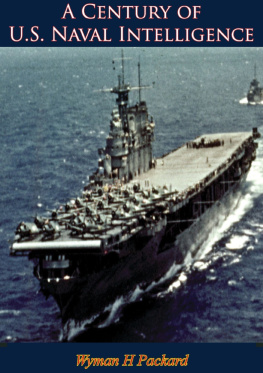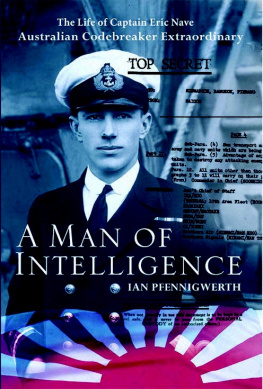

Barakaldo Books 2020, all rights reserved. No part of this publication may be reproduced, stored in a retrieval system or transmitted by any means, electrical, mechanical or otherwise without the written permission of the copyright holder.
Publishers Note
Although in most cases we have retained the Authors original spelling and grammar to authentically reproduce the work of the Author and the original intent of such material, some additional notes and clarifications have been added for the modern readers benefit.
We have also made every effort to include all maps and illustrations of the original edition the limitations of formatting do not allow of including larger maps, we will upload as many of these maps as possible.
A CENTURY OF U.S. NAVAL INTELLIGENCE
BY
CAPTAIN WYMAN H. PACKARD, USN. (RETIRED)

TABLE OF CONTENTS
Contents
DEDICATION
To all those who
prepared me for, encouraged me in, and helped me with,
this extensive research and writing effort
List of Tables
3.1. Naval Attachs Accredited Under Defense Attach System, 1974
4.1. Primary U.S. Navy Electronic Reconnaissance Aircraft
4.2. Incidents of U.S. Navy Electronic Reconnaissance Aircraft Facing Hostile Fire
9.1. Title and Organizational Designator of ONIs Translation Sections
9.2. Locations of the Translation Section
18.1. Heads, Special Intelligence Section, ONI
28.1. Intelligence Billets, Jul 1945-Aug 1946
28.2. ONI Personnel, Aug 1945-Jan 1996
28.3. Intelligence Billets, May 1958
29.1. Organized Reserve Officer Billets
29.2. Naval Intelligence Reserve Reorganization
30.1. U.S. Navy and Marine Corps Language Officers Who Studied in Japan, and Their Subsequent Intelligence Assignments
30.2. Air Intelligence Section Classes, 1960-1953
FOREWORD
For three decades since his retirement from the U.S. Navy, Captain Wyman H. Packard has worked diligently to compile his monumental history of U.S. Naval Intelligence. Two previous editions appeared in classified, limited distribution form, but former Director of Naval Intelligence RAdm. Thomas A. Brooks foresaw a wider audience for Capt. Packards labors and directed that a new, revised edition be prepared for open publication.
The resulting work is the product of a gratifying cooperation between the Office of Naval Intelligence and the Naval Historical Center, which throughout the project has provided major support to Capt. Packards researches and which saw this volume through the publication process. The joint effort is intended to provide intelligence professionals, scholars, and the general public with a detailed, topical accounting of the long and varied activities of U.S. Naval Intelligence on behalf of the nation. Equally important, it is hoped that the books detailed references to resources for further research will spark more work in a field that has not been adequately explored by historians in the past.
The role of naval intelligence in the success of the U.S. armed forces in time of war and in periods of often precarious peace deserves wider appreciation; Capt. Packard has indeed performed a magnificent service to the Office of Naval Intelligence through his painstaking labors.
M. W. CRAMER
Rear-Admiral, U.S. Navy
Director of Naval Intelligence
THE AUTHOR
Capt. Wyman H. Packard, USN (Ret.), served in active duty intelligence billets from 1946 to 1965, including one or more tours as Assistant Naval Attach, District Intelligence Officer, and Fleet Intelligence Officer. He also served in the Office of Naval Intelligence as Liaison Officer to other agencies, head of the Collection and Dissemination Branch, head of the Foreign Intelligence Division, and Deputy Director of Naval Intelligence.
His initial experiences in general line billets in the Navy following graduation from the U.S. Naval Academy in 1935 were in Tennessee (BB 43) in the Pacific, in Goff (DO 247) in the Atlantic and Caribbean, and in Hornet (CV 8) during its delivery of the Doolittle B-25 bomber group to its launching site in the Western Pacific for the attack on Japan. Capt. Packard continued to serve on board Hornet during the Battle of Midway, the air support to the Solomon Islands occupation forces, and the Battle of Santa Cruz where the carrier was sunk.
His first opportunity to use the output from intelligence production organizations was in 1942-1944, after the loss of Hornet when he was required to remain in the South Pacific as Assistant Operations Officer on the newly assembled staff of Adm. William F. Halsey, Commander South Pacific, in Noumea, New Caledonia. In 1945-1946, he worked on his first historical document, a highly classified summary of COMINCH participation in joint planning of special amphibious landing operations in World War II.
After retirement in October 1965, he started his research for this book on a volunteer basis and as time from his periodic consultant tasks permitted. Early classified editions issued by ONI had limited distribution in 1974 and 1978. When previously classified material was cleared for unclassified research, both the Director of Naval Intelligence and the Director of Naval History induced the author to work on this unclassified version.
He has also written numerous articles on various aspects of naval intelligence for the U.S. Naval Institute Proceedings and a thesis for its 1968 Naval Review . Since 1970, he has been corresponding secretary of his Naval Academy Class of 1935, writing a class news column for the Alumni Association monthly magazine Shipmate .
Capt. Packard resides in Arlington, Virginia.
PREFACE
This book is designed for use as a reference work, a topical chronology. Although those who have been involved in the events and situations described may find the book of interest, it has not been written primarily for that purpose.
Nearly all naval commands have been participants in the work of naval intelligence. Some have been involved regularly in the collection of intelligence information, and moat operating commands have been required to collect intelligence information under certain situations. Almost all commands, afloat and ashore, have been users of intelligence to varying degrees, depending on their missions and foreign involvement. Most major operating commands have had intelligence-processing capabilities for adapting available intelligence information to meet their own specific needs.
To produce a comprehensive history of intelligence in the Navy, it would have been necessary to research the history of all past and present elements of the Navy, not just of specific intelligence organizations. This task, of course, would have required much more than the part-time effort that this product represents. However, it is hoped that this book, although far from complete and containing many gape, will be of value to future researchers not only of U.S. Naval Intelligence but also of the Navys history in which naval intelligence has played such an important part.
The administrative histories of the Office of Naval Intelligence (ONI), various other intelligence organizations and major commands in World War II, and the command histories of the Naval Intelligence Command (NIC) and its field activities that have been produced since 1967 are voluminous and very detailed. To carry subjects through the time periods involved, many of the World War II histories have been summarized in this work. The individual command histories have been exploited to a limited extent as time permitted. To facilitate follow-on research, sources, which for the most part are located in the Operational Archives of the Naval Historical Center in Washington, D.C., are provided at the end of each chapter.
Next page







